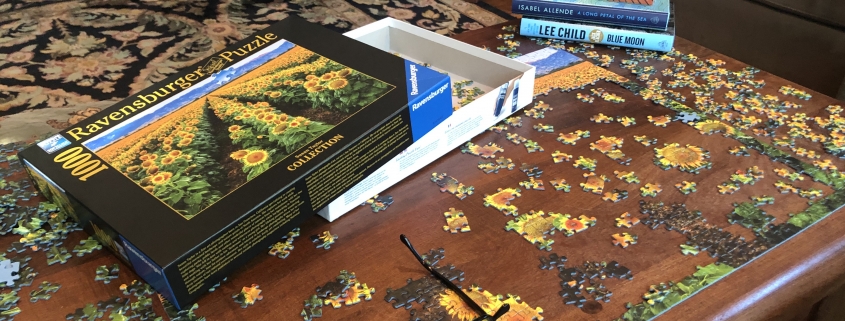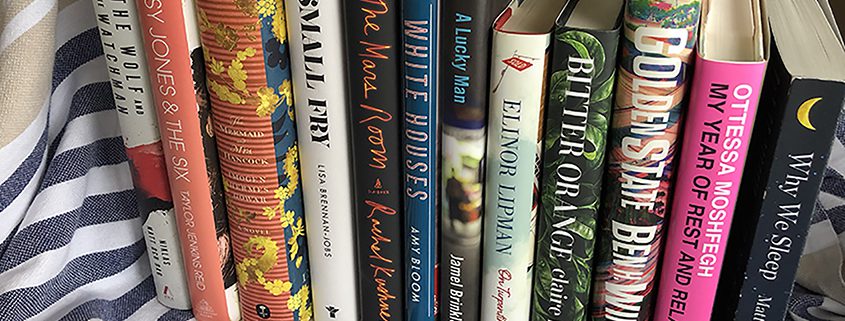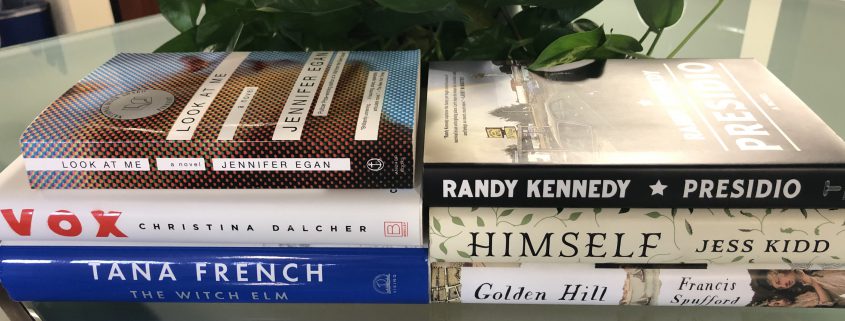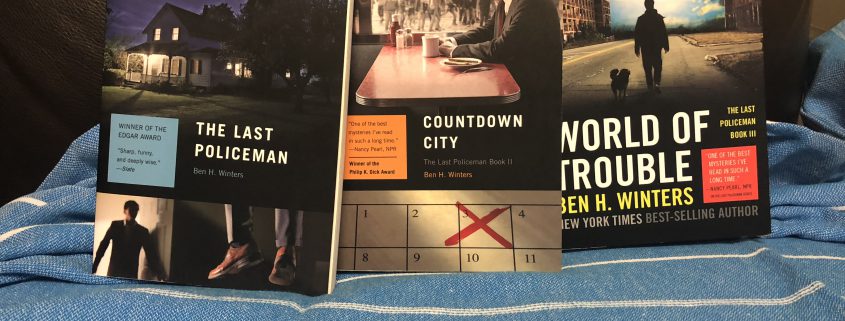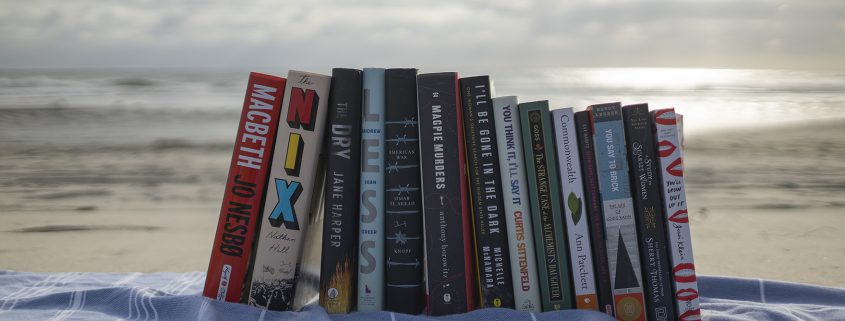We’re back with a new set of summer reading. Seems like everyone we know has a little more downtime in the summer (even working-outside-the-home parents). Here’s our set of recs, and, in case you don’t believe us, we always have a link to major news site’s review.
The Mermaid and Mrs. Hancock
by Imogen Hermes Gowar
The New York Times review
This is an intriguing first novel. It was a bestseller in the UK and made many of the Best of 2018 lists we scour each January. It appears on the surface to be an historical novel, set in 18th century London, on the seamier side of society. It reads a bit like Mark Twain’s The Gilded Age, or scenes out of any Dickens novel in that no one escapes the exposure of their character flaws to the reader. The book takes a slight left turn into the shallow end of mystical realism as our different characters collide and the story arc swings to crisis. And with that in stride, it moves from historical fiction and magical realism to the sneaking dread you find in classic gothic horror novels like Bram Stoker’s Dracula. Really a great book, genre-defying overall, and a page-turner. The author doesn’t hold back on the specifics of prostitution (in an age without antibiotics) so likely not appropriate for most younger teens. The movie rights have been sold, although we suspect it’s more likely to appear as a short TV series like Wolf Hall or The Night Manager.
Golden State
by Ben H. Winters
The Verge review
Even if you love the tendency towards a bit of the well-meaning nanny in some of the legislation in the state of California, you can easily buy into the premise of Winter’s newest novel, where we may have gone too far. After the world has been damaged by unbridled lying, at some time in the past, California has legislated absolute truth at all times. Each citizen records their day in a journal, sealing the pages in your own files, with the authorities able to access this information any time the facts need verification. Our detective has an allergy to lies, he can sense them as they are told. So when he shows up to an inquiry and doesn’t buy that it’s an accident, he starts digging, and has to begin to question the entire power structure. Like all dystopian futures, no one started out with a bad intent when the big change happened, it’s just likely the pendulum swung too far and certain that there will always be a corrupt elite who figures out how to work any system. Not a cheery book, but a great detective story with some interesting thoughts on truth and lies, which lets the reader reflect on our current reality. Winters has a knack for asking big questions via a detective story, so if you’re a Blade Runner fan (in the Philip K. Dick short story title—Do Androids Dream of Electric Sheep?—discussion sense), you’ll enjoy this book. (We previously recommended his Last Policeman trilogy.)
On Turpentine Lane
by Elinor Lipman
Washington Post review
If this is the first you’ve ever heard of Elinor Lipman, you’re going to busy this summer, because if you like one thing she’s written, you’ll want to read them all. Like a much funnier version of Anne Tyler or a more down to earth John Irving, Lipman takes a pretty simple set of ordinary circumstances for some very normal, regular folks, and all kinds of craziness ensues. In On Turpentine Lane, our hero, Faith, works for a local prep school’s development office writing really great thank you notes to donors in her hometown. While her 40-year-old fiance is walking across America as part of a self-discovery process, she decides to buy a house. While you worry that this relationship might not be a good one and that the house might be a money pit, the story takes a turn when a donor accidentally writes a big check to Faith and not the prep school, the house basement needs to be ripped up by the police as there may have been a murder, and that fiance is always posting photos on social media where he seems to be with other women, while hanging onto the joint credit card he has to be used just in case of emergency. While you have a feeling of (lighthearted) impending doom for much of the novel, each scene is funny with great dialogue between characters you really like, and it’s a great novel to escape the regular world. Excellent beach read, and if this one works, move on to the others. She’s never had a dud and there are a dozen or so. (One novel was made into the movie of the same name, Then She Found Me, but the movie is different than the book, and had mixed reviews.)
Why We Sleep: Unlocking the Power of Sleep and Dreams
by Matthew Walker
The Guardian review
I loved this book! You can preview the basic idea in Walker’s new TED Talk, but I really do recommend the book. Walker is a PhD, not an MD, but he knows all the research and he makes it simple to understand. Much of the books scares the hell out of you with all the things that go wrong in your body over the long haul when you don’t get enough sleep, so it’s a page turner, but the nature of this kind of books is each section and chapter logically follows, but it’s just not as fast a read as a history would be. If you know anyone that thinks they are doing great on 4-5 hours a night, he makes it clear that it’s statistically unlikely. To be the very rare person for whom that is true you need a very specific gene mutation. If you’ve already got problems sleeping, you don’t want this book as bedtime reading. If you need a little motivation to do all the things you read about when you click on headlines, this book is perfect. It’s very motivational. It is impossible to read even part of the book and not make a serious effort to improve your sleep hygiene and set yourself up for success. After reading I passed it one to my mom, and she recommended it and passed it on to her friends, and almost every single person made some little adjustment to their habits after reading the book. Highly recommended for students, because there is a lot of information about how to manage studying and sleeping in order to make retention of new information much easier. Must-read book for anyone who likes to lifehack.
My Year of Rest and Relaxation
by Ottessa Moshfegh
New Yorker review
This book is a love it or hate it proposition. It’s set in the immediate pre-9/11 NYC so as a reader you can’t avoid anticipating that horror the whole time you read. Meanwhile, the unnamed narrator is looking to get back on track by putting herself in a drugged coma for a year. If you appreciate the black humor of Heathers and its unlikable mean girls or American Psycho and its dark anti-hero, you’ll enjoy this book. It’s a great take on the year 2000, when the nineties tech boom was coming to an end and the pharmaceutical industry was going to save us all at an affordable price point. The last 20 years of revealed side effects, pharma bro pricing, and the opioid crisis make it possible to see the innocence of the novel’s time period. At the same time our narrator is such an incredibly flawed person, you can be pretty sure that a year of sleep isn’t going to help. Still, like one of those mad-dash caper movies through an crazy landscape (Scorsese’s After Hours comes to mind) you find yourself reading to find out where this going. However much you know it won’t end well, you really can’t predict where it is going, and once our heroine starts blacking out regularly, she begins the most unreliable of all narrators. If your sense of humor leans towards the dark, you’ll love this book, it’s dark, ridiculous, and funny. If you want a realistic story of someone trying to productively better themselves, stay away, because every wrong turn and terrible companion will frustrate you. No one has the kind of life she does, so this book is definitely a great escape from regular life. Any project manager or producer will have to admit to a sneaky admiration for a really well-planned project, even if the core project idea is insane.
The Mars Room
by Rachel Kushner
The Guardian review
Rachel Kushner is an amazing writer. This review isn’t going to be able to give you any comparisons to other books or movies. She’s more like the smartest friend you’ve ever had and once she goes down some rathole, you find yourself mesmerized by some obscure subject you would swear you had no interest in understanding. She make most TED Talks seem like Sesame Street. My closest comparison would be a war reporter, like Sebastian Junger, because she moves really fast, the stakes are high, and you don’t have a clue where the dangers are or what is coming next. The Mars Room tells you the story of American mass incarceration through the eyes of single-mom Romy. She’s got a backstory like every stripper in every movie you’ve ever seen, except this time you really feel it—and feel a lot more trapped by her circumstances than she does—as the story unfolds. It’s not a feel-good book, but it’s a mesmerizing story, and it’s important for all of us to really understand the downside of bare-knuckle capitalism. If you don’t feel lucky right now, you will after you read this book. Kushner is a writer whose books will be read 50 years from now. She does her research and she’s utterly fearless. She’s also one of the best prose stylists writing today and her books are propulsive, they speed you through, way too fast for comfort and you know there’s genius at work. If you’re old enough to have been a teen or young adult who had enough freedom to run a little wild outside the purview of adults, you’ll appreciate the accounts of Romy’s teen years in the Bay Area and how close we can accidentally skate to danger when we’re too young to know better. Geniuses can be difficult, but they are always worth the trouble, so Kushner is one to seek out.
Daisy Jones & The Six
by Taylor Jenkins Reid
The New York Times review
Let’s confess right off the top that we read a rave review of the audio version of Daisy Jones & The Six, and that’s how we initially consumed it (for free via San Diego City Library apps, BTW). The audio is narrated by an all-star cast, including Jennifer Beals as Daisy. Since the book is a fake documentary with all the interviews woven together through the story in chronological order, it makes for an excellent audio experience as well as a very easy reading experience. Seven points of view can be covered on a single page when enough of the characters have something to say about an event. If you’re reading this blog review, you know us at LYON and can imagine how this appeals to us as storytellers who spend a lot of time in the documentary genre, interweaving multiple interviews into a cohesive whole. Daisy and The Six have separate paths in the music industry of ’70s California, but when they meet up, things take off personally and professionally. The book isn’t high art by a long shot but it’s just a fast-moving lot of fun with a nostalgic look at the ’70s, California, the music business, and life in general. Like any story that features voices looking backwards in time, there’s a certain amount of reassurance that it all worked out one way or another. Some days that’s a really welcome reminder to take a long-term perspective as you thrash your way through the difficulties of your present. Still don’t think this is fun? Well, Reese Witherspoon already snapped up the rights and has a 13-episode deal with Amazon Prime. If nothing else, reading the book and arguing with your friends about your respective fantasy casting picks would make for a great day off from work.
White Houses
by Amy Bloom
The Guardian review
Amy Bloom is another long-time favorite author with an interest in all the different ways love manifests in our lives, for better or worse. (Her short stories on parent-child relationships will rip your heart out.) This book focuses on Eleanor Roosevelt’s longtime relationship with Lorena Hickok, told by Hick herself. It’s a front-row seat to a pivotal presidential administration, in a key moment both in world and US history. if that isn’t interesting enough, it’s told by an outsider with limited power to influence the outcome, a journalist’s eye for the story, rooted in the all-too-familiar idea of a White House mired in sexually scandalous behavior behind the scene. The book doesn’t try and make any big comments about the current state of American politics, but reading about the incredible charm and deep flaws of people in power always makes for a great story. When you can add in the curve of a love over 15 years as the book goes back and forth from 1945 to the early ’30s, you’ve got a riveting mix. I’m not sure how certain historians are about whether the Roosevelt/Hickok friendship veered into a lesbian romance, but it works for the novel (and modern-day sensibilities) to assume the relationship was sexual as well as emotional.
Bitter Orange
by Claire Fuller
The Guardian review
I have a weakness for SoCal Noir. There’s just something about really dark things happening in a sunny location that always gets me. Imagine my surprise in picking up a British novel set in a manor during an oppressive hot spell. The book’s main character, Frances, is an old woman dying of an unspecified ailment, and she looks back to the long, hot summer of 1969 she spent with the charming Peter and Cara. Peter is onsite to catalogue the interior of the manor, Lyntons, for the new, rich, absent, American owner while Frances is there to record the fascinations of the outside rock gardens. Frances at 39 during the earlier hot summer at Lyntons has missed out on much of life, and is free for this job only because her mother has recently died. Not the bona fides of a reliable narrator, and when the people she’s so charmed by might be actively lying to her, the danger thickens as you read on. Frances is that great fictional character combination of very bright and very naive—something you rarely find in real life, particularly in someone old enough, at 39, to be trailing the sense of a perhaps irredeemably wasted life. A great escape book, if you enjoy your escapes with some high-level tension. Perfect for fans of Daphne Du Maurier’s Rebecca. Also best started on a day when you can afford to stay up late for a couple of nights to finish the book.
Small Fry
by Lisa Brennan-Jobs
NPR review
I was determined not to read this book. Sure, I’m an Apple fan and it’s clear from all accounts that Steve Jobs was a brilliant, flawed human. But what got me was reviewer after reviewer raving about Lisa Brennan-Jobs’ actual writing. This book was on a ton of Best of 2018 lists for the writing talent as much as the personal story she tells. The writing lives up to the hype. While you know who her father was, what really makes this a great read in the spirit of Tara Westover’s Educated is the contrast of a person trying to make a life between two extremes, starting as a young child. Her mother makes her welfare income ends meet by cleaning houses while her father takes Apple public and spends much of his lifetime in the 1%—and in the top echelon of super star business geniuses during the decades they±ve routinely become household names. It’s impossible to imagine anyone, at any age, could be truly comfortable in both of those milieus, but most biographies tell you a story about moving from the bad fit to the good fit. It’s pretty clear Lisa doesn’t feel the fit is right in either one. I imagine her childhood extremes gave her that writerly ability to step back and assess the scene and the players, including herself, with an incredibly keen eye. As much as I love an unreliable narrator in fiction, I love a truly astute observer in non-fiction. I’d read whatever she writes next—I think she can probably take even a less torn-from-celebrity-headlines subject fascinate me. If you still aren’t sure about the book, try her essay Waterloo where the California outsider tells a story about Harvard insiders.
The Wolf and the Watchman
by Niklas Natt Och Dag
Washington Post review
If you thought modern-day Swedish noir was grim, try this one set in 1793. We’ve still got corruption, lies, and irrational beliefs but we’ve also got all kinds of very real problems from the 18th century. Our odd couple detectives, are polar opposites. A lawyer named Winge—intellectual, idealistic, and dying of consumption—is teamed up with the watchman of the title—a cynical, brutal, one-armed survivor of the recent war with Russia. The clock is ticking as they look for the murderer but in 1793 it seems possible no one will survive. A good fit for Game of Thrones fans with a fondness for detective novels.
A Lucky Man (Stories)
by Jamel Brinkley
NPR review
This book of short stories was a 2018 National Book Award finalist along with some other books and writers I liked, so I had to check it out. While it’s a slim volume with nine stories, Brinkley packs a lot into every story. Some short stories are a charming slice of life view, that tell you a single thing about a character or moment in time. These stories tell you as much about the characters as some novels do. He’s wrestling with masculinity, which is a big topic to tackle. What it is, what it should be, how we got these ideas in the first place, how it ages over time, and where we go from here. While he’s focused on the experiences of men of color and the stories are located in Brooklyn and the Bronx, we all have families, friends, and homes and ponder variations on these themes. I’m not sure what the stats are on a debut making the National Book award finalists, but Jamel Brinkley is clearly a writer to watch going forward. These short stories are a great summer read if you are short on time, because with the small investment of time to read one single story, you’ll have a lot to think about. This collection could easily be read over a long period of time—there are no fluffy forgettable snippets in here.

